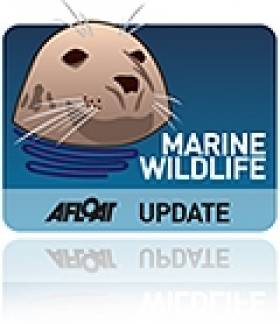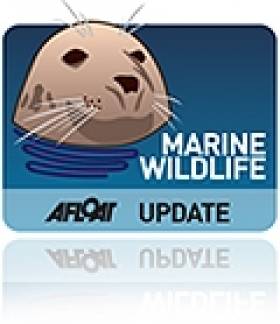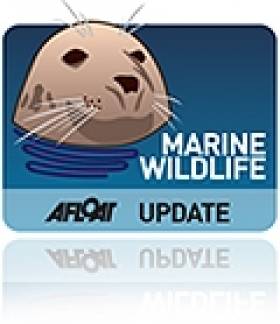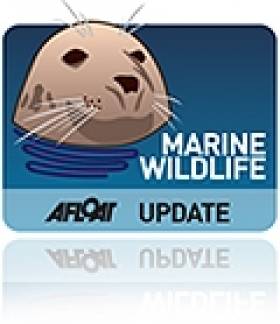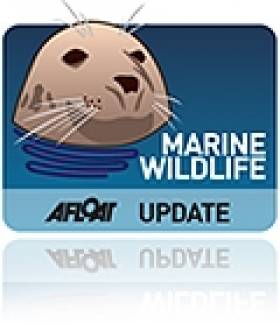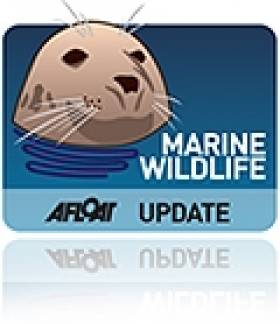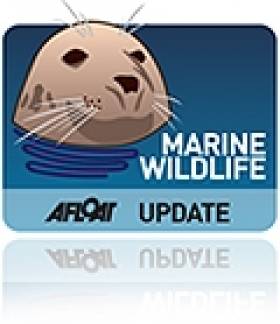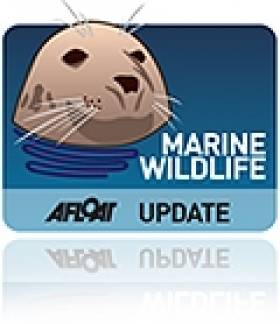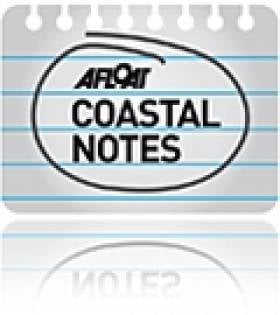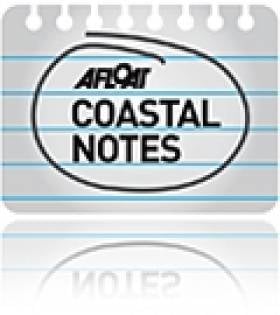Displaying items by tag: marine wildlife
RV Celtic Explorer Seeks Out Atlantic Whales and Dolphins
#MARINE WILDLIFE – A team of twenty scientists and students from Ireland, Northern Ireland and Scotland are currently onboard the Marine Institute's RV Celtic Explorer carrying out a multidisciplinary study of cetaceans, megafauna and birdlife around the areas of the Goban Spur and Porucpine seabight in the Atlantic Ocean.
The survey team, led by Dr. Joanne O'Brien from the Marine Biodiversity Research Group of Galway-Mayo Institute of Technology (GMIT) will be at sea for just under two weeks (24th February – 5th March). "This is a unique opportunity to explore offshore waters across a range of disciplines, and gather data from many previously un-surveyed areas of Ireland's marine territory. It also provides an excellent training ground for marine undergraduate and post graduate students out at sea," explained Dr. O'Brien.
Also participating in this survey are members from Irish Whale and Dolphin Group, University College Cork, Queens University, Belfast; University of Aberdeen, National University of Ireland Galway, Birdwatch Ireland, Sligo Institute of Technology and MEER Consultancy.
The Cetacean team are researching key habitats and activity of baleen whales and offshore bottlenose dolphins. "Visual and acoustic surveys are being carried out, in which the team have successfully taken a skin sample from an offshore group of bottlenose dolphins for DNA analysis as well as adding a number of individually recognisable animals to the photo-id catalogue" said Conor Ryan from GMIT.
The images will be compared with existing photo-identification catalogues held both nationally and internationally. This helps scientists to understand the extensive migration patterns of the whales and dolphins in the Northeast Atlantic and their seasonal visits to the Irish and UK coastlines. "During this research cruise, we have proven that the collection of darted tissue samples of cetaceans, for genetic and chemical pollutant analyses is feasible in offshore waters," said Mr Ryan.
Marine scientists will carry out a systematic analysis of CTD (Conductivity, Temperature and Depth) sampling at set locations in order to explore relationships between the temperature of the water, primary productivity and top predator presence of marine mammals along the continental shelf habitat.
The megafauna team will also be conducting a visual survey of basking sharks. They will attempt to deploy tags to monitor their movements. Where possible, mucus scrapings will be collected to determine the genomics and DNA of each of the species.
The seabird team aims to characterise the seabird species and populations at the most southern part of Ireland's marine territory. The information gathered will contribute towards the Irish national biological database and can be used to inform management towards the conservation of offshore bird species. So far the team have found largest concentrations of birds towards the top of the shelf edge where they benefit from increased food availability from upwellings. The highlight of the survey thus far was a sighting of a black-browed albatross, normally found in the Southern Ocean.
Samples of the Mauve Stinger jellyfish Pelagia noctiluca are also being gathered to investigate the prevalence of the bacterium Tenacibaculum maritimum which has serious economic implications for fin-fish aquaculture, while also providing further insight into the biological factors influencing ecosystem functioning.
Finally, the Plankton team are taking samples of phytoplankton, zooplankton and krill from depths of 3000m. This information is important to develop an understanding of what forms the basis of the food chain which supports cetaceans, seabirds and other marine megafauna in these habitats.
The Cetaceans on the Frontier III survey is supported under the Marine Institutes' competitive ship-time scheme, funded through the Marine Research Sub-programme of the National Development Plan 2007–2013, as part of the Sea Change strategy.
Follow the Cetaceans on the Frontier III blog here, where the survey team are givingdaily updates and showing photos of their expedition.
New Season of Summer Whale Watching Courses on Cape Clear
#MARINE WILDLIFE - The Irish Whale and Dolphin Group (IWDG) has announced another series of its popular whale watching courses on Cape Clear in West Cork this summer.
The courses cater for adults keen to learn more about whales and dolphins in Irish waters and how to observe, record and identify them. They will feature a mixture of workshops and field trips, including cliff and boat-based whale watches.
Three weekend courses will take place on 25-27 May, 20-22 July and 7-9 September, led by IWDG sightings co-ordinator Pádraig Whooley. All are open to IWDG members and non-members alike, but places are limited to 20 places each weekend on a first-come-first-served basis.
Admission is €70 for IWDG members (€90 for non-members), with a non-refundable deposit of €25 required. Please note that this fee does not cover transport to Cape Clear, food or accomodation (which is limited in high summer) or any boat trips. As the itinerary will be weather-dependant, some flexibility will be required.
More information on the weekends and booking details are available at the IWDG website HERE.
In other IWDG news, the group has secured another grant from the Island Foundation to continue its humpback whale research in Cape Verde this spring and summer.
A shore-based team will be stationed in Boa Vista in an area that is "possibly the most important site for breeding humbacks in the entire northeast Atlantic".
North Atlantic Killer Whales Feeding on Sunfish Says IWDG
#MARINE WILDLIFE - The Irish Whale and Dolphin Group (IWDG) has recorded another first for the North Atlantic, with evidence showing that killer whales are feeding on ocean sunfish.
Mark Holmes of the Natural History Museum confirmed the presence of parasites unique to the sunfish found within the carcass of a female orca stranded in Doohooma in Co Mayo.
"These parasites did not originate from the whale's stomach, but came from the prey which it had eaten," said the IWDG's Conor Ryan.
"This was confirmed when the partially digested bones in the stomachs were eventually identified as those of a sunfish beak."
The discovery may explain a recent study of UK waters which found sunfish taking unusually deep dives, possibly to avoid cetaceans and other large predators.
Fears Over Illegal Cull as Seals, Dolphin Die on Waterford Beach
#MARINE WILDLIFE - Fears are growing of an illegal cull of marine wildlife after a seal and dolphin were discovered dead on a Waterford beach - just hours after two seals were found dying from bullet wounds in the same location.
TheJournal.ie reports that the wounds on the two animals found on Tramore Beach on Thursday are also believed to be from gunshot.
Two grey seals were euthanised the previous evening after they were discovered gravely injured with "horrific" wounds on the same beach.
A spokesperson for the Irish Seal Sanctuacy (ISS) has called for a post-mortem of the animals to determine the exact cause of death - but pointed the finger at an illegal cull allegedly carried out by local fishermen.
"We’re not against a properly regulated cull," said the ISS's Johnny Woodlock, "but it’s the guy who goes out with a shotgun and takes potshots, that’s what we’re against.”
TheJournal.ie has more on the story HERE, including an image that many may find distressing.
President Michael D Becomes Sole Patron of IWDG
#MARINE WILDLIFE - Newly-elected Irish President Michael D Higgins has agreed to be the sole patron of the Irish Whale and Dolphin Group (IWDG).
President Higgins has a long history of supporting environmental causes. In his inaugural speech he referred to Ireland’s strong cultural, scientific and technological ethos.
IWDG chairman Kevin MacCormick welcomed the President’s decision as a strong endorsement of the group’s work in protecting Ireland's marine wildlife.
He stated: “The IWDG will continue to maintain a sense of pride in our extraordinary national marine heritage and our need for stewardship of the natural environment through research, education and conservation policies.”
The IWDG is Ireland’s only conservation group dedicated to protecting whales and dolphins in Irish waters. It celebrated its 21st anniversary in December 2011.
Work Begins to Eliminate Sea Squirts in North Wales
#MARINE WILDLIFE - Work on exterminating sea squirts at a marina in north Wales has begun.
The £250,000 (€301,000) project by the Countryside Council for Wales involves attaching giant bags to the subsurface structures around the marina in Holyhead, which is hoped will stop the clean flow of water to the sea squirts, causing them to suffocate and die.
Marine biologist Rohan Holt, who is managing the project, said: “If we successfully eradicate the sea squirt, we will work hard to make sure that it does not recolonise.
"This will mean careful monitoring in Holyhead marina and other marinas and popular mooring areas throughout Wales to check that it hasn’t reappeared."
The sea creature threatens shellfish by spreading like a blanket across the seabed and other surfaces.
As previously reported on Afloat.ie, colonies of the invasive Japanese sea squirt are posing a throat to mussel and scallop bed in the Menai Strait between Anglesey and the mainland.
Boats from Ireland have been blamed for carrying the invasive pest into Holyhead.
The Daily Post has more on the story HERE.
Video of Talk on the 'Mysterious' Basking Shark
#MARINE WILDLIFE - TED have posted video of the Irish Whale and Dolphin Group's Dr Simon Berrow giving a talk on the biggest fish in Ireland's waters, the mysterious basking shark.
The second largest fish in the world, basking sharks are almost extinct, and we know almost nothing about them.
But despite their huge size, we do know that they are among the friendlies of Ireland's marine wildlife.
Recorded at the TEDxDublin event at Dublin's Science Gallery in December 2010, the video above shows Dr Berrow describing the fascinating creature (known as the 'Great Fish of the Sun' in Irish) and the surprisingly low-tech methods he's employing in learning all he can to save them.
Humpback Whale Spotted Off Achill
#MARINE WILDLIFE - The Irish Whale and Dolphin Group has confirmed the sighting of a humpback whale off Achill Island in Co Mayo last weekend.
Surfers off Keel Beach were credited with the discovery, after spotting a large whale of 30-60ft breaking the surface multiple times, lifting its tail fluke vertically.
The sighting is only the fifth validated record of a humpback whale off the coastal area from Galway to Donegal.
"It remains something of a mystery as to why sightings of this species remain such relatively rare events along our west and northwest compared to our south and southwest coasts," says IWDG sightings co-ordinator Pádraig Whooley.
"This latest sighting is a timely reminder that species such as humpbacks can and do turn up in places that are well outside what we perceive to be the known 'hotspots'."
Humpback whales tend to feed in inshore waters, which should make them increasingly easier for the public to spot from the shore, he added.
The IWDG has more on the story HERE.
New Observation Tower Will Give Views of the Irish Sea
#COASTAL NOTES - BBC News reports that construction has begun on a new observation tower on the Lancashire coastline with views over the Irish Sea.
The new tower at Rossall Point, which will reach 14 metres (46ft) upon completion, will act as a base for the UK's National Coastwatch Institution.
A platform at the top will be open to the public providing ample vistas of the Irish Sea's marine wildlife for birdwatchers and more, while the view from the top will also be projected on a screen in the education centre to be located in the tower's ground floor.
Dolphin Group Comments on Dalkey Island Prospect
#DALKEY ISLAND PROSPECT - The Irish Whale and Dolphin Group (IWDG) has joined the chorus of opposition to the proposed oil and gas exploration off Dalkey Island in Co Dublin.
As previously reported on Afloat.ie, Providence Resources has applied for a foreshore licence to search for oil or gas about 6km out to sea on the Kish Bank Basin.
But the prospect has provoked a split in the local community over the potential risks and benefits, with many calling for a public enquiry into the licence before it is granted.
This evening an urgent meeting in Dun Laoghaire will address the public's concerns, which have been echoed by the IWDG.
"The Kish Bank and adjacent waters are important for cetaceans," said the group in a statement. "In addition, sightings of bottlenose dolphins have increased dramatically in the area following the presence of a group of three individuals since August 2010."
The IWDG is concerned about the potential effects on dolphins and porpoises that "could due to noise generated from the drilling process", noting that "there is little published data on the intensity and effects of sound generated by drilling".
Protest group Protect Our Coast has launched a online petition against the Dalkey Island Prospect citing concerns over the proximity of the drilling area to the mainland as well as the Special Protection Area of Dalkey Island, which is a haven for marine wildlife.
- Irish Whale and Dolphin Group
- IWDG
- Dalkey Island Prospect
- Coastal Notes
- Dalkey Island
- Dublin
- oil and gas
- exploration
- drilling
- Providence Resources
- foreshore licence
- Kish Bank Basin
- community
- Dun Laoghaire
- bottlenose dolphins
- Porpoises
- Cetaceans
- noise
- sound
- Protect Our Coast
- protest
- petition
- Special Protection Area
- marine wildlife



























